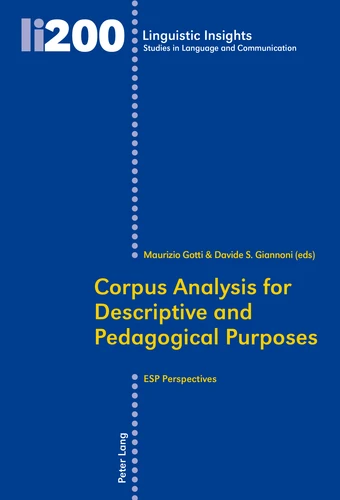- Accueil /
- Maurizio Gotti
Maurizio Gotti

Dernière sortie
Corpus Analysis for Descriptive and Pedagogical Purposes
There is hardly any aspect of verbal communication that has not been investigated using the analytical tools developed by corpus linguists. This is especially true in the case of English, which commands a vast international research community, and corpora are becoming increasingly specialised, as they account for areas of language use shaped by specific sociolectal (register, genre, variety) and speaker (gender, profession, status) variables.
Corpus analysis is driven by a common interest in ‘linguistic evidence', viewed as a source of insights into language phenomena or of lexical, semantic and contrastive data for subsequent applications. Among the latter, pedagogical settings are highly prominent, as corpora can be used to monitor classroom output, raise learner awareness and inform teaching materials. The eighteen chapters in this volume focus on contexts where English is employed by specialists in the professions or academia and debate some of the challenges arising from the complex relationship between linguistic theory, data-mining tools and statistical methods.
Corpus analysis is driven by a common interest in ‘linguistic evidence', viewed as a source of insights into language phenomena or of lexical, semantic and contrastive data for subsequent applications. Among the latter, pedagogical settings are highly prominent, as corpora can be used to monitor classroom output, raise learner awareness and inform teaching materials. The eighteen chapters in this volume focus on contexts where English is employed by specialists in the professions or academia and debate some of the challenges arising from the complex relationship between linguistic theory, data-mining tools and statistical methods.
There is hardly any aspect of verbal communication that has not been investigated using the analytical tools developed by corpus linguists. This is especially true in the case of English, which commands a vast international research community, and corpora are becoming increasingly specialised, as they account for areas of language use shaped by specific sociolectal (register, genre, variety) and speaker (gender, profession, status) variables.
Corpus analysis is driven by a common interest in ‘linguistic evidence', viewed as a source of insights into language phenomena or of lexical, semantic and contrastive data for subsequent applications. Among the latter, pedagogical settings are highly prominent, as corpora can be used to monitor classroom output, raise learner awareness and inform teaching materials. The eighteen chapters in this volume focus on contexts where English is employed by specialists in the professions or academia and debate some of the challenges arising from the complex relationship between linguistic theory, data-mining tools and statistical methods.
Corpus analysis is driven by a common interest in ‘linguistic evidence', viewed as a source of insights into language phenomena or of lexical, semantic and contrastive data for subsequent applications. Among the latter, pedagogical settings are highly prominent, as corpora can be used to monitor classroom output, raise learner awareness and inform teaching materials. The eighteen chapters in this volume focus on contexts where English is employed by specialists in the professions or academia and debate some of the challenges arising from the complex relationship between linguistic theory, data-mining tools and statistical methods.
Les livres de Maurizio Gotti

New Trends and Methodologies in Applied English Language Research II. Studies in Language Variation, Meaning and Learning
Maurizio Gotti, David Tizón couto, Iria Pastor gomez, Beatriz Tizon-couto
70,00 €

64,20 €

39,20 €

72,50 €

95,00 €

95,00 €

74,20 €
